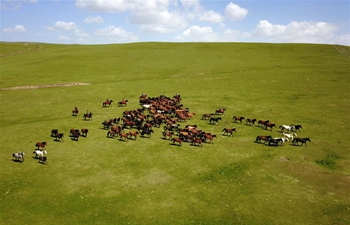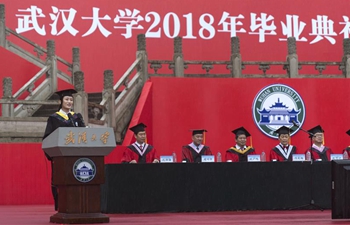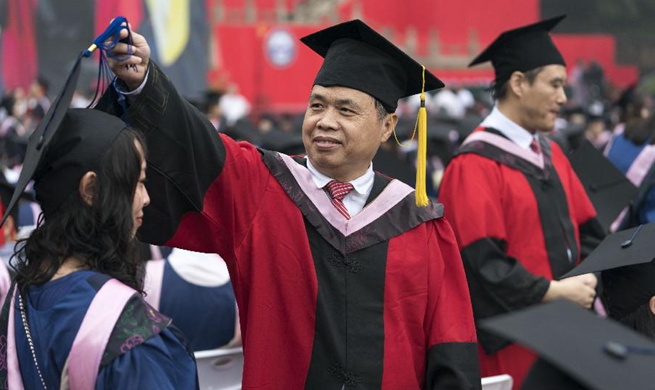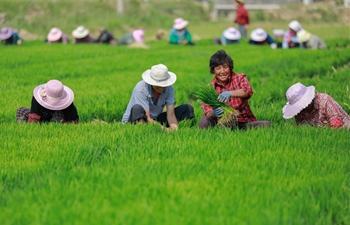ZHENGZHOU, June 23 (Xinhua) -- Despite growing up in the countryside, Shi Pengfei's life was envied by many.
His father began as a poor farmer in Weishi County, Henan Province, who worked hard and was soon able to open a drug store, providing the family with a much better lifestyle than most of their fellow villagers.
Shi was lucky enough to attend XJTLU, a cooperation project between Xi'an Jiaotong University and the University of Liverpool. The final two years of his bachelor's degree were spent studying in Liverpool in the UK.
So it came as quite a shock when he returned home after graduation in 2014 and found himself widely derided as a "loser" by the selfsame villagers who had given him such a rousing sendoff two years before.
Villagers had expected him to find a good job in a big city, if not abroad, and were shocked and dismayed when he returned to his rural home expecting to make a living there. His choice of farming as a career made no sense to people who spent much of their lives trying to escape from endless toil in muddy fields.
Now, at 26, Shi is boss of a cooperative with more than 100 hectares of contracted farmland devoted to high-end produce including Australian red-clawed crayfish, loach and mushrooms.
PIGS, PEPPERS, PENURY
Weishi County is a base for traditional crops like wheat, corn and beans that provide little more than subsistence for individual farmers tilling their own plots.
During his time in Liverpool, he had the chance to observe intensive farming in action, and saw an opportunity to return to his agricultural roots.
"I saw huge potential in farming back home," he told Xinhua.
His parents were devastated, believing the money spent on his tuition had been wasted. They had sent their son to market with the family's metaphorical cow and he had returned with little more than a handful of "magic beans."
"My mom wailed and sobbed all night long. She wanted me to become a civil servant," he recalled. Undaunted by these maternal histrionics, Shi contracted seven hectares of farmland, acquired some black pigs, planted green peppers, and completely failed to make any money.
Black pigs are expensive. Their lean meat has an excellent reputation in the Chinese market. With no idea how to care for them, Shi's pigs grew so fat that meat packers refused to buy them. The peppers rotted in the fields as Shi found few buyers and no refrigeration for storage.
The next year his carp, a hard-to-raise fish with low-quality flesh that sells cheaply, died in the pond.
Shi may not have known much about farming, but he knew how to learn a lesson. He decided to hire "professionals," including graduates in animal epidemiology and aquiculture, and offered them a share of his company.
HARMONY IN THE FIELDS
A business administration degree did not help Shi much as he sweated over managing the cooperative, quite the opposite.
His employees were made to clock in and clock out. Shi made deductions from their wages if they made mistakes. His "modern methods" achieved nothing. Indeed, they did more harm than good, as his rigid system did little but rile his staff and breed tension.
Moreover, as his farm laborers were paid by the day, they became exceptionally prone to loafing on the job. One day, Shi inspected a field that had already been "weeded" and found roots everywhere, concealed beneath a thin layer of topsoil.
"Unlike obedient company employees, these laborers, many of whom were my relatives, would not listen to me at all," Shi recalled.
Frustrated by his own managerial inadequacies, he decided to hire respected villagers to manage his laborforce and began to pay his workers according to their productivity: The more you work, the more you earn.
"Personal relations are important in management, something which can't be learned from textbooks," he said. Shi decided to work in the fields alongside his laborers, not just to learn more about farming, but to establish better relationships with his employees. He now has 60 full-time workers and up to 200 casual laborers in peak season.
Villagers take home not only the wages they get from Shi but also rent for their farmland from the cooperative.
With the help of his professional advisors, Shi's ponds now swarm with crayfish and loaches. His polytunnels are fat with fungi. Tourists come for sightseeing and stay to pick grapes and cherries.
He finally made profit -- 2 million yuan (300,000 U.S. dollars) -- in 2017.
Professional farmers, those who are skilled in agriculture, technology and management, number over 14 million in China today with the number expected to exceed 20 million by 2020.
"We can't secure our profits unless we target the high-end of the market with high value-added products. Those products only exist as a result of the harmony between technical expertise and the sweat of our workers' brows," Shi said.

















